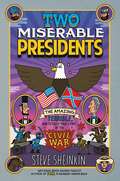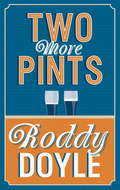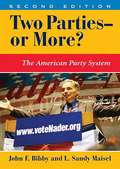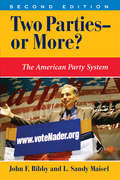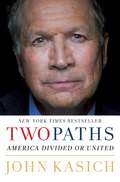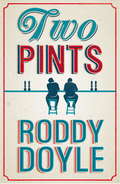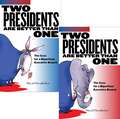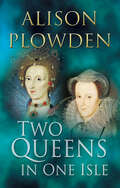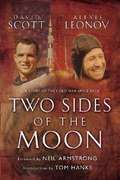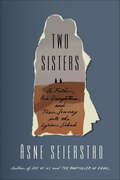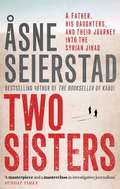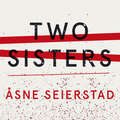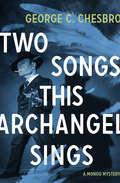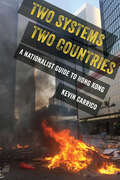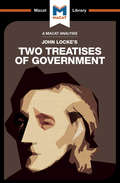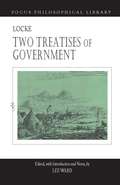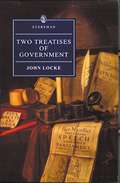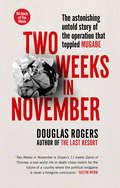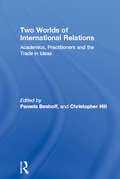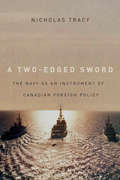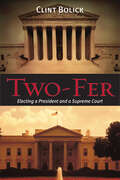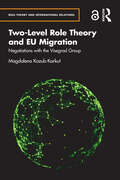- Table View
- List View
Two Miserable Presidents: Everything Your Schoolbooks Didn't Tell You About the Civil War
by Steve SheinkinGet the feeling something big is about to happen? Welcome to the Civil War―one of the scariest, saddest, and occasionally wackiest stories in American History. 1856: Northern and Southern settlers attack each other in Kansas. 1858: Congressmen start sneaking guns and knives into the Senate chamber. 1860: President James Buchanan is heard wailing, “I am the last president of the United States!” That Congressman, Preston Brooks, was ready to attack Senator Charles Sumner of Massachusetts over remarks Sumner made slamming senators who supported slavery in Kansas. Brooks lifted his cane to beat Sumner, and here the action in the book stops, so that Steve Sheinkin can explain just where this confrontation started. In the process, he unravels the complicated string of events – the small things, the personal ones, the big issues– that led to The Civil War. It is a time and a war that threatened America's very existence, revealed in the surprising true stories of the soldiers and statesmen who battled it out.
Two More Pints
by Roddy DoyleFollowing on Two Pints, another hilarious book on everything that matters from the brilliant Roddy Doyle. Two men meet for a pint -- or two -- in a Dublin pub. They chew the fat, set the world to rights, curse the ref, say a last farewell. In this second collection of delicious comic dialogues Doyle's drinkers ponder: * a topless Kate Middleton * Barack and Michelle Obama * David Beckham ("Would you tattoo your kids' names on the back of your neck?" "They wouldn't fit.") * Jimmy Savile ("a gobshite") * the financial crisis (again) * abortion (again) * and horsemeat in your burger... Once again, those we have lost troop through their thoughts -- Lou Reed, Seamus Heaney, Reg Presley, Nelson Mandella, Phil Everly, Margaret Thatcher, Shirley Temple -- and they still have that unerring ability to ask the really fundamental questions like "Would you take penalty points for your missis?"
Two Parties--or More?
by L. Sandy Maisel John F BibbyStudents of American government are faced with an enduring dilemma: Why two parties? Why has this system remained largely intact while around the world democracies support multiparty systems? Should our two-party system continue as we enter the new millennium? This newly revised and updated edition of Two Parties-Or More? answers these questions by placing the dilemma in the context of recent elections and the environment in which all parties must function. The text provides students with a historical overview of minor parties and their impact on politics. By focusing on Ross Perot's efforts in 1992 and 1996 and the difficulty the Reform party faced in 2000, Jesse Ventura's gubernatorial victory in Minnesota, and Ralph Nader's Green party campaign for the presidency in 2000, the text lays out the current dilemma regarding third parties and explores the extent and cause of the current dissatisfaction with the two major parties. The authors conclude with predictions about the future of third-party politics in the states and the nation. The text is enhanced with a glossary, discussion questions, and an appendix of important third parties in presidential elections and recent officeholders who were neither Democrats nor Republicans. The revised edition highlights the implications of recent successes (Angus King in Maine in 1994 and 1998, Ventura in Minnesota, Perot in 1992, and Nader in 2000) and failures (the Reform party in 2000 and fewer third party winners in the states) of third party efforts for the future of America's traditionally two-party system.
Two Parties--or More?
by L. Sandy Maisel John F. BibbyAnswers the question “Why is the American political system limited to only two parties?” The second edition includes coverage of Ralph Nader in the 2000 election.
Two Parties--or More?
by L. Sandy Maisel John F. BibbyStudents of American government are faced with an enduring dilemma: Why two parties? Why has this system remained largely intact while around the world democracies support multiparty systems? Should our two-party system continue as we enter the new millennium? This newly revised and updated edition of Two Parties-Or More? answers these questions by placing the dilemma in the context of recent elections and the environment in which all parties must function. The text provides students with a historical overview of minor parties and their impact on politics. By focusing on Ross Perot's efforts in 1992 and 1996 and the difficulty the Reform party faced in 2000, Jesse Ventura's gubernatorial victory in Minnesota, and Ralph Nader's Green party campaign for the presidency in 2000, the text lays out the current dilemma regarding third parties and explores the extent and cause of the current dissatisfaction with the two major parties. The authors conclude with predictions about the future of third-party politics in the states and the nation. The text is enhanced with a glossary, discussion questions, and an appendix of important third parties in presidential elections and recent officeholders who were neither Democrats nor Republicans. The revised edition highlights the implications of recent successes (Angus King in Maine in 1994 and 1998, Ventura in Minnesota, Perot in 1992, and Nader in 2000) and failures (the Reform party in 2000 and fewer third party winners in the states) of third party efforts for the future of America's traditionally two-party system.
Two Parties--or More?: The American Party System, Second Edition (Dilemmas In American Politics Ser.)
by John F BibbyStudents of American government are faced with an enduring dilemma: Why two parties? Why has this system remained largely intact while around the world democracies support multiparty systems? Should our two-party system continue as we enter the new millennium? This newly revised and updated edition of Two Parties-Or More? answers these questions by
Two Paths: America Divided or United
by John KasichWhen Ohio governor John Kasich ran for president, his powerful message of hope and togetherness struck a chord with American voters. In Two Paths: America Divided or United, he carries that message forward by reflecting on the tumultuous 2016 campaign, sharing his concerns for America and his hopes for our future, and sounding a clarion call to reason and purpose, humility and dignity, righteousness and calm.“The country never looked so grand and magnificent as it did from ten thousand feet,” he writes of his time on the campaign trail, “and it was always a thrilling, faith-affirming thing to look out our window and see the sun splashing across Bryce Canyon in Utah, or the lights of the New York skyline at night as we flew past the Statue of Liberty, or an open field in the heartland that ran as far as our eyes could see.... I’d look out and think what an honor it would be to lead this great nation, what a blessing.”To be sure, the full story of the 2016 Presidential race will be written over time, but to understand what it was to be on the front lines of one of the most divisive and corrosive campaign battlegrounds in history, readers won’t find a richer, more thoughtful firsthand account than this one—a frank, refreshing assessment of the American dynamic and a clear path we might follow toward a more promising tomorrow.As Governor Kasich reminds us in these pages, America is great because America is good—and because Americans have stayed true to who we are: one nation, under God, indivisible.
Two Pints
by Roddy DoyleA collection of sublimely funny dialogues inspired by a year's worth of news. Two men meet for a pint in a Dublin pub. They chew the fat, set the world to rights, take the piss... They talk about their wives, their kids, their kids' pets, their football teams and -- this being Ireland in 2011-12 -- about the euro, the crash, the presidential election, the Queen's visit. But these men are not parochial or small-minded; one of them knows where to find the missing Colonel Gadaffi (he's working as a cleaner at Dublin Airport); they worry about Greek debt, the IMF and the bondholders (whatever they might be); in their fashion, they mourn the deaths of Whitney Houston, Donna Summer, Davy Jones and Robin Gibb; and they ask each other the really important questions like 'Would you ever let yourself be digitally enhanced?'
Two Presidents Are Better Than One: The Case for a Bipartisan Executive Branch
by David Orentlicher“Many Americans are unsatisfied with politics. Simultaneously, we are hesitant to question the basic soundness of our constitutional system. In this refreshingly provocative book, David Orentlicher explains why it is due time for us to reconsider dominant ideas about the presidency, now arguably our most powerful political institution. Challenging the conventional wisdom that the best executive is necessarily a unitary executive, Orentlicher makes a wonderful case for why ‘two presidents are better than one.’ Sure to be of interest to political scientists, legal scholars, as well as informed citizens justifiably worried about the fate of American democracy, this fascinating book dares to challenge everything you thought you knew about one of our favorite political institutions.”—William E. Scheuerman, Indiana University “Can Orentlicher be serious in calling for a plural executive? The answer is yes, and he presents thoughtful and challenging arguments responding to likely criticisms. Any readers who are other than completely complacent about the current state of American politics will have to admire Orentlicher’s distinctive audacity and to respond themselves to his well-argued points.”—Sanford Levinson, author of Framed: America’s 51 Constitutions and the Crisis of Governance When talking heads and political pundits make their “What’s Wrong with America” lists, two concerns invariably rise to the top: the growing presidential abuse of power and the toxic political atmosphere in Washington. In Two Presidents Are Better Than One, David Orentlicher shows how the “imperial presidency” and partisan conflict are largely the result of a deeper problem—the Constitution’s placement of a single president atop the executive branch. Accordingly, writes Orentlicher, we can fix our broken political system by replacing the one person, one-party presidency with a two-person, two-party executive branch. Orentlicher contends that our founding fathers did not anticipate the extent to which their checks and balances would fail to contain executive power and partisan discord. They also did not foresee how the imperial presidency would aggravate partisan conflict. As the stakes in presidential elections have grown ever higher since the New Deal, battles to capture the White House have greatly exacerbated partisan differences. Had the framers been able to predict the future, Orentlicher argues, they would have been far less enamored with the idea of a single leader at the head of the executive branch and far more receptive to the alternative proposals for a plural executive that they rejected. Like their counterparts in Europe, they might well have created an executive branch in which power is shared among multiple persons from multiple political parties. Analyzing the histories of other countries with a plural executive branch and past examples of bipartisan cooperation within Congress, Orentlicher shows us why and how to implement a two-person, two-party presidency. Ultimately, Two Presidents Are Better Than One demonstrates why we need constitutional reform to rebalance power between the executive and legislative branches and contain partisan conflict in Washington.
Two Queens in One Isle: The Deadly Relationship of Elizabeth I and Mary Queen of Scots
by Alison PlowdenThe relationship between Queen Elizabeth I of England and her cousin, Mary Queen of Scots, is one of the most complex, tempestuous and fascinating in history. United in blood but divided by religion, the two women were in some ways uniquely close; in others, poles apart. Championed by English Catholics as the rightful Queen of England, Mary was nevertheless given protection by her cousin after she was deposed amid outrage at her immoral behaviour. Rumours of papist plots involving Mary were rife and Elizabeth was put under extreme pressure to be rid of this dangerous threat to her sovereignty and to the Protestant church in England. After much reluctance and procrastination Elizabeth finally signed Mary's death warrant. Alison Plowden shows how political fear brought out the worst and yet the best in these women, and how history was overshadowed for centuries afterwards.
Two Sides of the Moon: Our Story of the Cold War Space Race
by David Scott Neil Armstrong Christine Toomey Tom Hanks Alexei LeonovSpace was one of the most fiercely fought battlegrounds of the Cold War, the Moon its ultimate beachhead. In this dual autobiography,Apollo 15 commander David Scott and cosmonaut Alexei Leonov, the first man to ever walk in space, recount their exceptional lives and careers spent on the cutting edge of science and space exploration—and their participation in the greatest technological race ever—to land a man on the Moon. With each mission fraught with perilous tasks, and each space program touched by tragedy, these parallel tales of adventure and heroism read like a modern-day thriller. Cutting fast between their differing recollections, this book reveals, in a very personal way, the drama of one of the most ambitious contests ever embarked on by man, set against the conflict that once held the world in suspense: the clash between Communism and Western democracy. Through the men's memoirs, their courage, passion for exploration, and determination to push themselves to the limit, emerge not only through their triumphs but also through their perseverance in times of extraordinary difficulty and danger. "Two Sides of the Moon is unique among space histories. If you are looking for a balanced, interesting, and personal account of the American and Soviet space programs during the 1960s and 1970s this is it. " ---Astronomy Magazine
Two Sisters: A Father, His Daughters, and Their Journey into the Syrian Jihad
by Åsne SeierstadThe riveting true story of two sisters’ journey to the Islamic State and the father who tries to bring them homeTwo Sisters, by the international bestselling author Åsne Seierstad, tells the unforgettable story of a family divided by faith. Sadiq and Sara, Somali immigrants raising a family in Norway, one day discover that their teenage daughters, Leila and Ayan, have vanished—and are en route to Syria to aid the Islamic State. Seierstad’s riveting account traces the sisters’ journey from secular, social democratic Norway to the front lines of the war in Syria, and follows Sadiq’s harrowing attempt to find them.Employing the same mastery of narrative suspense she brought to The Bookseller of Kabul and One of Us, Seierstad puts the problem of radicalization into painfully human terms, using instant messages and other primary sources to reconstruct a family’s crisis from the inside. Eventually, she takes us into the hellscape of the Syrian civil war, as Sadiq risks his life in pursuit of his daughters, refusing to let them disappear into the maelstrom—even after they marry ISIS fighters. Two Sisters is a relentless thriller and a feat of reporting with profound lessons about belief, extremism, and the meaning of devotion.
Two Sisters: The international bestseller by the author of The Bookseller of Kabul
by x Asne Seierstad'Åsne Seierstad is the supreme non-fiction writer of her generation ... Two Sisters isn't only the story of how a pair of teenage girls became radicalised but an unsparing portrait of our own society - of its failings and its joys' Luke HardingOn 17 October 2013, teenage sisters Ayan and Leila Juma left their family home near Oslo, seemingly as usual. Later that day they sent an email to their unsuspecting parents, confessing they were on their way to Syria. They had been planning the trip for months in secret.Åsne Seierstad - working closely with the family - followed the story through its many dramatic twists and turns. This is, in part, a story about Syria. But most of all it is a story of what happens to apparently ordinary people when their lives are turned upside down by conflict and tragedy.'A masterpiece and a masterclass in investigative journalism' Christina Lamb, Sunday Times'Meticulously documented, full of drama ... this is a tale fluently told, and a thriller as well' Kate Adie, Literary Review'A masterwork. Brilliantly conceived, scrupulously reported and beautifully written, this book is compulsive reading' Jon Lee Anderson
Two Sisters: The international bestseller by the author of The Bookseller of Kabul
by x Asne SeierstadOne morning in October 2013, nineteen-year-old Ayan Juma and her sixteen-year-old sister Leila left their family home in Oslo. Later that day they sent an email to their parents. 'Peace, God's mercy and blessings upon you, Mum and Dad ... Please do not be cross with us...' Leila and Ayan had decided to travel to Syria, 'and help out down there as best we can'. They had been planning for months. By the time their desperate father Sadiq tracks them to Turkey, they have already crossed the border. But Sadiq is determined to find them. What follows is the gripping, heartbreaking story of a family ripped apart. While Sadiq risks his own life to bring his daughters back, at home his wife Sara begins to question their life in Norway. How could her children have been radicalised without her knowledge? How can she protect her two younger sons from the same fate? Åsne Seierstad - with the complete support of the Juma family - followed the story from the beginning, through its many dramatic twists and turns. It's a tale that crosses from Sadiq and Sara's original home in Somalia, to their council estate in Oslo, to Turkey and to Syria - where two teenage sisters must face the shocking consequences of their decision.
Two Songs This Archangel Sings (The Mongo Mysteries #5)
by George C. ChesbroA detective&’s search for a missing friend &“careens ahead with the speed and promise of danger of the Indy 500&” (The Washington Post Book World). With a genius IQ, a past career as a circus acrobat, and a black belt in karate, criminology professor Dr. Robert Frederickson—better known as &“Mongo the Magnificent&”—has a decidedly unusual background for a private investigator. He also just so happens to be a dwarf. Mongo&’s friend and sensei, Veil Kendry, is pretty magnificent himself. A devoted martial arts instructor and extremely successful abstract artist, Veil single-handedly transformed his shady neighborhood in New York City&’s Lower East Side into a safe haven from crime and corruption. But when Mongo enters Veil&’s abandoned apartment and finds a bullet hole, a cryptic oil painting, and an envelope addressed to him containing $10,000, he starts to worry that Veil&’s reputation as a vigilante has gotten him into the worst sort of trouble. Determined to find his friend, Mongo attempts to rule out any enemies from Veil&’s past—details of which Veil has never shared with him. But as he uncovers the shocking truth of Veil&’s time in the Vietnam War—participating in dangerous CIA missions under the call sign &“Archangel&”—Mongo soon finds enemies aplenty, ones that will do anything to make sure the past remains a secret . . . In addition to creating &“the most engaging detective in decades,&” author George C. Chesbro introduces the character of Veil Kendry, who would go on to have his own series (Library Journal). Two Songs This Archangel Sings is the 5th book in the Mongo Mysteries, but you may enjoy reading the series in any order.
Two Systems, Two Countries: A Nationalist Guide to Hong Kong
by Kevin CarricoAs Hong Kong is integrated into the People’s Republic of China, ever fewer people in the city identify as Chinese. Two Systems, Two Countries explains why.Two Systems, Two Countries traces the origins of Hong Kong nationalism and introduces readers to its main schools of thought: city-state theory, self-determination, independence, and returnism. The idea of Hong Kong independence, Kevin Carrico shows, is more than just a provocation testing Beijing’s red lines: it represents a collective awakening to the failure of One Country Two Systems and the need to transcend obsolete orthodoxies. With a conclusion that examines Hong Kong nationalism’s influence on the 2019 protest movement, Two Systems, Two Countries is an engaging and accessible introduction to the tumultuous shifts in Hong Kong politics and identity over the past decade.
Two Treatises of Government
by Ian Jackson Jeremy KleidostyJohn Locke’s 1689 Two Treatises of Government is a key text in the history of political theory – one whose influence remains marked on modern politics, the American Constitution and beyond. Two Treatises is more than a seminal work on the nature and legitimacy of government. It is also a masterclass in two key critical thinking skills: evaluation and reasoning. Evaluation is all about judging and assessing arguments – asking how relevant, adequate and convincing they are. And, at its heart, the first of Locke’s two treatises is pure evaluation: a long and incisive dissection of a treatise on the arguments in Sir Robert Filmer’s Patriarcha. Filmer’s book had defended the doctrine that kings were absolute rulers whose legitimacy came directly from God (the so-called “divine right of kings”), basing his arguments on Biblical explanations and evidence. Locke carefully rebutted Filmer’s arguments, on their own terms, by reference to both the Bible and to recorded history. Finding Filmer’s evidence either to be insufficient or unacceptable, Locke concluded that his argument for patriarchy was weak to the point of invalidity. In the second of Locke’s treatises, the author goes on to construct his own argument concerning the sources of legitimate power, and the nature of that power. Carefully building his own argument from a logical consideration of man in “the state of nature”, Locke creates a convincing argument that civilised society should be based on natural human rights and the social contract.
Two Treatises of Government
by John Locke Peter LaslettThis is the revised version of Peter Laslett's acclaimed edition of Two Treatises of Government, which is widely recognised as one of the classic pieces of recent scholarship in the history of ideas, read and used by students of political theory throughout the world. This 1988 edition revises Dr Laslett's second edition (1970) and includes an updated bibliography, a guide to further reading and a fully reset and revised introduction which surveys advances in Locke scholarship since publication of the second edition. In the introduction, Dr Laslett shows that the Two Treatises were not a rationalisation of the events of 1688 but rather a call for a revolution yet to come.
Two Treatises of Government
by John Locke Lee WardDesigned to serve the needs of students confronting Locke's political thought for the first time, Lee Ward's edition offers a faithful text of Two Treatises of Government with modernized spelling and punctuation. Its Editor's Introduction outlines the main arguments of these works, illustrates the conceptual thread uniting the less frequently read First Treatise with the far more famous Second Treatise, and locates Locke's work amid the turbulent constitutional battles of 1690s England. Helpful notes at the foot of the page, a Thematic Index, and an up-to-date Bibliography are also provided.
Two Treatises of Government
by John Locke Mark GoldieThis is the first modernized edition of the Two Treatises based on Locke's own corrected text as he left it for posterity at his death. Includes introduction, chronology of Locke's life and times, extensive glossary and key word index.
Two Weeks In November: The astonishing untold story of the operation that toppled Mugabe
by Douglas RogersTwo Weeks in Novemberis the thrilling, surreal, unbelievable and often very funny true story of four would-be enemies - a high ranking politician, an exiled human rights lawyer, a dangerous spy and a low-key white businessman turned political fixer - who team up to help unseat one of Africa's longest serving dictators, Robert Mugabe.What begins as an improbable adventure destined for failure, marked by a mixture of bravery, strategic cunning and bumbling naiveté, soon turns into the most sophisticated political-military operation in African history. By virtue of their being together, the unlikely team of misfit rivals is suddenly in position to spin what might have been seen as an illegal coup into a mass popular uprising that the world - and millions of Zimbabweans - will enthusiastically support.Impeccably researched, deftly written, and told in the style of a contemporary political thriller, Two Weeks in November throws you into the very heart of ‘the game’, a dangerous hidden world that makes you question what is real, what is choreographed, and whether anything can really change in a country where the same players are still dictating the rules.
Two Worlds of International Relations: Academics, Practitioners and the Trade in Ideas
by Christopher Hill Pamela BeshoffThe aims of this book are to discover how significant academic work in international relations has become for practitioners involved in policy formulation and implementation, and to examine the impact of the policy community on academic work and academic values.On the academic side, theoretical, historical and political economy perspectives are presented. On the practitioner side, there are contributions from diplomats, lawyers and parliamentarians. The principal question at issue is whether, if there is a natural partnership between the modern academic and foreign policy makers, there needs to be preserved a respectful distance between the two worlds.
Two-Edged Sword: The Navy as an Instrument of Canadian Foreign Policy (Carleton Library Series #225)
by Nicholas TracyIn the first major study of the Royal Canadian Navy's contribution to foreign policy, Nicholas Tracy takes a comprehensive look at the paradox that Canada faces in participating in a system of collective defence as a means of avoiding subordination to other countries. Created in 1910 to support Canadian autonomy, the Royal Canadian Navy has played an important role in defining Canada's relationship with the United Kingdom, the United States, and NATO. Initially involved with participation in Imperial and Commonwealth defence, the RCN's role shifted following the Second World War to primarily ensuring the survival of the NATO alliance and deflecting American influence over Canada. Tracy demonstrates the ways in which the Navy's priorities have realigned since the end of the Cold War, this time partnering with the US and NATO navies in global policing. Insightful, detailed, and grounded in solid historical scholarship, A Two-Edged Sword presents a complete portrait of the shifting relevance and future of a cornerstone of Canadian defence.
Two-Fer: Electing a President and a Supreme Court
by Clint BolickConstitutional scholar Clint Bolick examines the importance of judicial nominations in current and future political campaigns—not just in campaigns for president but also for the senators who confirm the nominees and the governors who appoint state court judges. He offers his opinion of the framers' original intentions—that the judiciary play a robust role in curbing abuses of government power and protecting individual rights—and provides both a historical perspective and a look at the courts' decisions on today's most contentious issues.
Two-Level Role Theory and EU Migration: Negotiations with the Visegrad Group (Role Theory and International Relations)
by Magdalena Kozub-KarkutApplying role theory and Putnam’s two-level game framework to the European migration crisis of 2015, Magdalena Kozub-Karkut expertly shows how the Czech Republic, Slovakia, Hungary, and Poland used the crisis to contest their roles in the European Union (EU) and how each country and the V4, as a group, subsequently used their new contested roles in the bargaining process within the EU structures. In doing so, Kozub-Karkut demonstrates how international negotiations might be used by the chief negotiators as a way of triggering contestation and enhancing their position at the domestic level as well as how role contestation processes from the domestic level might be used at the international one.Two-Level Role Theory and EU Migration is an excellent resource for scholars and students of Foreign Policy Analysis, International Relations Theory, European Studies, and Migrations Studies.Chapter 3 and 7 of this book is freely available as a downloadable Open Access PDF at http://www.taylorfrancis.com under a Creative Commons Attribution-Non Commercial-No Derivatives (CC-BY-NC-ND) 4.0 license.
